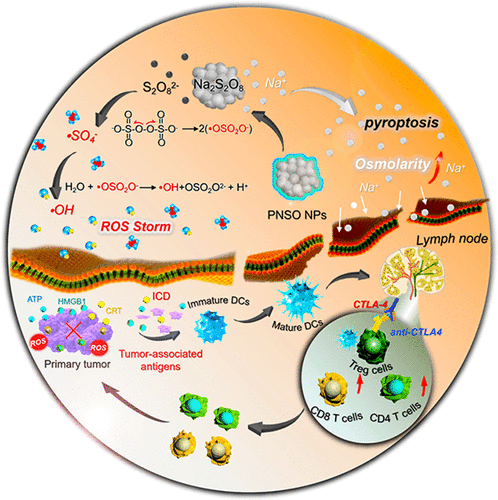当前位置:
X-MOL 学术
›
J. Am. Chem. Soc.
›
论文详情
Our official English website, www.x-mol.net, welcomes your
feedback! (Note: you will need to create a separate account there.)
Na2S2O8 Nanoparticles Trigger Antitumor Immunotherapy through Reactive Oxygen Species Storm and Surge of Tumor Osmolarity
Journal of the American Chemical Society ( IF 14.4 ) Pub Date : 2020-12-18 , DOI: 10.1021/jacs.0c09482 Yang Liu 1, 2 , Wenyao Zhen 2 , Yinghui Wang 1 , Shuyan Song 1, 2 , Hongjie Zhang 1, 2, 3
Journal of the American Chemical Society ( IF 14.4 ) Pub Date : 2020-12-18 , DOI: 10.1021/jacs.0c09482 Yang Liu 1, 2 , Wenyao Zhen 2 , Yinghui Wang 1 , Shuyan Song 1, 2 , Hongjie Zhang 1, 2, 3
Affiliation

|
Although more attention has been attracted to the therapy based on reactive oxygen species (ROS) for tumor therapy in recent years, such as photodynamic therapy and chemodynamic therapy, the limited ROS production rate leads to their poor treatment effect owing to the relatively low content of O2 and H2O2 in tumor microenvironments, confined light penetration depth, strict Fenton reaction conditions (pH 3-4), and so on. Therefore, it is urgent to explore the new agents with highly efficient ROS generation capacity. Herein, we first prepared phospholipid coated Na2S2O8 nanoparticles (PNSO NPs) as new ROS generation agents for in situ generating Na+ and S2O82- through gradual degradation, which can then be changed to toxic •SO4- (a novel reported ROS) and •OH regardless of the amount of H2O2 and pH value in the tumor microenvironment (TME). As the generation of a large amount of Na+, PNSO NPs can bypass the ion transport rules of cells through endocytosis to deliver large amounts of Na+ into the cells, resulting in a surge of osmolarity and rapid cell rupture and lysis. Osmotic pressure induced by PNSO NPs will further lead to an unusual manner of cell death: caspase-1-related pyroptosis. Moreover, all of above effects will cause high immunogenic cell death, regulate the immunosuppressed TME, and then activate systemic antitumor immune responses to combat tumor metastasis and recurrence. We believe PNSO NPs will be new and potential ROS generation agents, and this work will broaden the thinking of the exploring of new antitumor nanodrugs.
中文翻译:

Na2S2O8 纳米粒子通过活性氧物质风暴和肿瘤渗透压升高触发抗肿瘤免疫治疗
尽管近年来基于活性氧(ROS)的疗法,如光动力疗法和化学动力疗法等治疗肿瘤受到更多关注,但由于活性氧含量相对较低,ROS产生率有限导致其治疗效果不佳。肿瘤微环境中的 O2 和 H2O2、密闭光穿透深度、严格的 Fenton 反应条件(pH 3-4)等。因此,迫切需要探索具有高效 ROS 生成能力的新代理。在此,我们首先制备了磷脂包覆的 Na2S2O8 纳米粒子(PNSO NPs)作为新的 ROS 生成剂,通过逐步降解原位生成 Na+ 和 S2O82-,然后可以将其转变为有毒的 •SO4-(一种新型报道的 ROS)和 •OH。肿瘤微环境 (TME) 中 H2O2 的量和 pH 值。随着大量Na+的产生,PNSO NPs可以通过内吞作用绕过细胞的离子转运规律,将大量Na+输送到细胞内,导致渗透压升高,细胞迅速破裂和裂解。PNSO NPs 诱导的渗透压将进一步导致一种不寻常的细胞死亡方式:caspase-1 相关的细胞焦亡。此外,所有上述作用都会导致高免疫原性细胞死亡,调节免疫抑制的 TME,然后激活全身抗肿瘤免疫反应,以对抗肿瘤转移和复发。我们相信 PNSO NPs 将是新的和潜在的 ROS 生成剂,这项工作将拓宽探索新的抗肿瘤纳米药物的思路。PNSO NPs 可以通过内吞作用绕过细胞的离子传输规则,将大量 Na+ 输送到细胞中,导致渗透压激增和细胞快速破裂和裂解。PNSO NPs 诱导的渗透压将进一步导致一种不寻常的细胞死亡方式:caspase-1 相关的细胞焦亡。此外,所有上述作用都会导致高免疫原性细胞死亡,调节免疫抑制的 TME,然后激活全身抗肿瘤免疫反应,以对抗肿瘤转移和复发。我们相信 PNSO NPs 将是新的和潜在的 ROS 生成剂,这项工作将拓宽探索新的抗肿瘤纳米药物的思路。PNSO NPs 可以通过内吞作用绕过细胞的离子传输规则,将大量 Na+ 输送到细胞中,导致渗透压激增和细胞快速破裂和裂解。PNSO NPs 诱导的渗透压将进一步导致一种不寻常的细胞死亡方式:caspase-1 相关的细胞焦亡。此外,所有上述作用都会导致高免疫原性细胞死亡,调节免疫抑制的 TME,然后激活全身抗肿瘤免疫反应,以对抗肿瘤转移和复发。我们相信 PNSO NPs 将是新的和潜在的 ROS 生成剂,这项工作将拓宽探索新的抗肿瘤纳米药物的思路。caspase-1 相关的细胞焦亡。此外,所有上述作用都会导致高免疫原性细胞死亡,调节免疫抑制的 TME,然后激活全身抗肿瘤免疫反应,以对抗肿瘤转移和复发。我们相信 PNSO NPs 将是新的和潜在的 ROS 生成剂,这项工作将拓宽探索新的抗肿瘤纳米药物的思路。caspase-1 相关的细胞焦亡。此外,所有上述作用都会导致高免疫原性细胞死亡,调节免疫抑制的 TME,然后激活全身抗肿瘤免疫反应,以对抗肿瘤转移和复发。我们相信 PNSO NPs 将是新的和潜在的 ROS 生成剂,这项工作将拓宽探索新的抗肿瘤纳米药物的思路。
更新日期:2020-12-18
中文翻译:

Na2S2O8 纳米粒子通过活性氧物质风暴和肿瘤渗透压升高触发抗肿瘤免疫治疗
尽管近年来基于活性氧(ROS)的疗法,如光动力疗法和化学动力疗法等治疗肿瘤受到更多关注,但由于活性氧含量相对较低,ROS产生率有限导致其治疗效果不佳。肿瘤微环境中的 O2 和 H2O2、密闭光穿透深度、严格的 Fenton 反应条件(pH 3-4)等。因此,迫切需要探索具有高效 ROS 生成能力的新代理。在此,我们首先制备了磷脂包覆的 Na2S2O8 纳米粒子(PNSO NPs)作为新的 ROS 生成剂,通过逐步降解原位生成 Na+ 和 S2O82-,然后可以将其转变为有毒的 •SO4-(一种新型报道的 ROS)和 •OH。肿瘤微环境 (TME) 中 H2O2 的量和 pH 值。随着大量Na+的产生,PNSO NPs可以通过内吞作用绕过细胞的离子转运规律,将大量Na+输送到细胞内,导致渗透压升高,细胞迅速破裂和裂解。PNSO NPs 诱导的渗透压将进一步导致一种不寻常的细胞死亡方式:caspase-1 相关的细胞焦亡。此外,所有上述作用都会导致高免疫原性细胞死亡,调节免疫抑制的 TME,然后激活全身抗肿瘤免疫反应,以对抗肿瘤转移和复发。我们相信 PNSO NPs 将是新的和潜在的 ROS 生成剂,这项工作将拓宽探索新的抗肿瘤纳米药物的思路。PNSO NPs 可以通过内吞作用绕过细胞的离子传输规则,将大量 Na+ 输送到细胞中,导致渗透压激增和细胞快速破裂和裂解。PNSO NPs 诱导的渗透压将进一步导致一种不寻常的细胞死亡方式:caspase-1 相关的细胞焦亡。此外,所有上述作用都会导致高免疫原性细胞死亡,调节免疫抑制的 TME,然后激活全身抗肿瘤免疫反应,以对抗肿瘤转移和复发。我们相信 PNSO NPs 将是新的和潜在的 ROS 生成剂,这项工作将拓宽探索新的抗肿瘤纳米药物的思路。PNSO NPs 可以通过内吞作用绕过细胞的离子传输规则,将大量 Na+ 输送到细胞中,导致渗透压激增和细胞快速破裂和裂解。PNSO NPs 诱导的渗透压将进一步导致一种不寻常的细胞死亡方式:caspase-1 相关的细胞焦亡。此外,所有上述作用都会导致高免疫原性细胞死亡,调节免疫抑制的 TME,然后激活全身抗肿瘤免疫反应,以对抗肿瘤转移和复发。我们相信 PNSO NPs 将是新的和潜在的 ROS 生成剂,这项工作将拓宽探索新的抗肿瘤纳米药物的思路。caspase-1 相关的细胞焦亡。此外,所有上述作用都会导致高免疫原性细胞死亡,调节免疫抑制的 TME,然后激活全身抗肿瘤免疫反应,以对抗肿瘤转移和复发。我们相信 PNSO NPs 将是新的和潜在的 ROS 生成剂,这项工作将拓宽探索新的抗肿瘤纳米药物的思路。caspase-1 相关的细胞焦亡。此外,所有上述作用都会导致高免疫原性细胞死亡,调节免疫抑制的 TME,然后激活全身抗肿瘤免疫反应,以对抗肿瘤转移和复发。我们相信 PNSO NPs 将是新的和潜在的 ROS 生成剂,这项工作将拓宽探索新的抗肿瘤纳米药物的思路。





















































 京公网安备 11010802027423号
京公网安备 11010802027423号